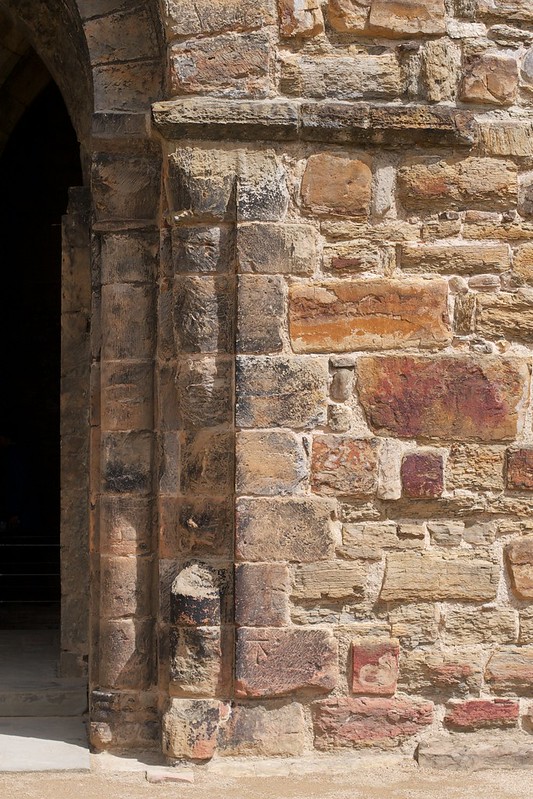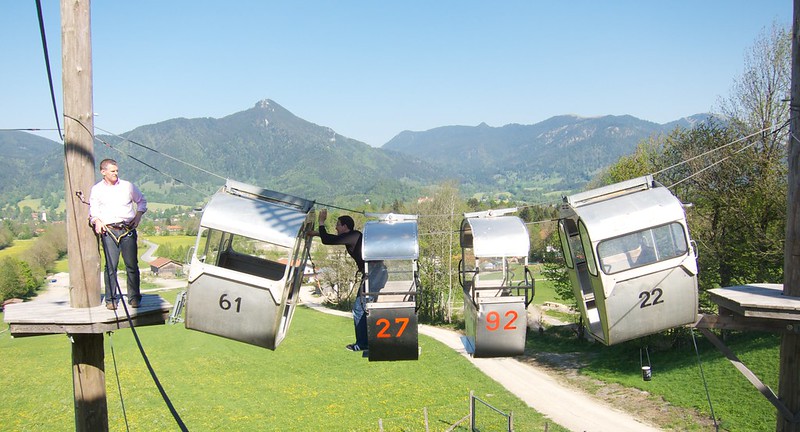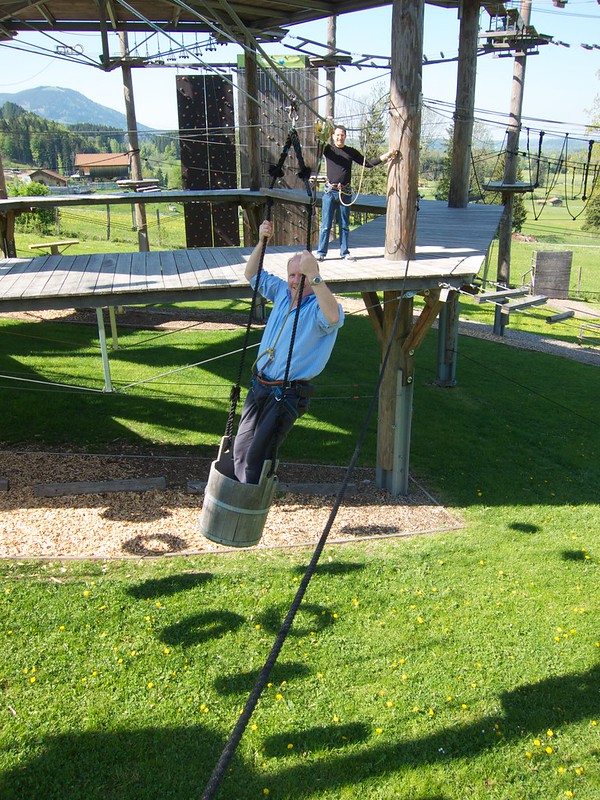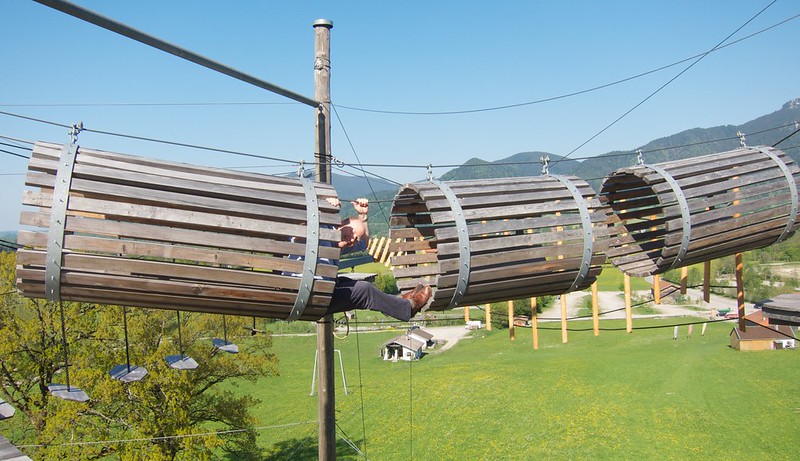Richmond is a lovely town in Yorkshire, with the remains of a very fine medieval castle. I loved the colour of the stone at the base of the keep…
Monthly Archives: May, 2011
Rigging
A couple of weeks ago, I had fun with friends on this giant climbing frame in Bavaria. It was a work trip, but we had some time off too. It was either this or Powerpoint slides…
Great fun. You can find plenty more photos of the Hochseilgarten, including my co-climbers, Steve Hales and Ray Gordon, here.
Alright, Mr. DeMille, I’m ready for my close-up.
OpenCV is a wonderfully full-featured computer vision library. I’ve just written a very simple demo of the built-in face recogniser. It finds a face and scales it to a fixed size. If you watch my eyes in the viewfinder window, you’ll see they stay pretty much in the same place however I move around the room.
All sorts of things could be done to improve the frame-rate if needed, but this was just a quick test I put together over a couple of hours while learning about the library. Back in ancient history, when I did my PhD, this kind of thing would have taken weeks… The title of this post, if you’re not familiar with it, is from the famous closing scene of Sunset Boulevard, which you can see here. Of course, as soon as I thought of using this title, I realised that I could also grant Gloria Swanson’s greatest wish. So here’s my version…
It needs some smoothing, but still quite fun.
The birth of a shed
In November 2009, we had a new studio built in our back garden. I had a webcam pointing at it.
Last Bank Holiday, I finally got around to doing something with the nearly two million images it had captured.
Except for those directly involved, I doubt many will want to spend 16 minutes watching this! But it might be fun to skim through!
Many thanks to the good folks at Croft Design and Build. We’re very pleased with the results.
Want a bargain degree?
 The Guardian is running a piece under an attention-grabbing but rather irresponsible headline: The £135 university lecture – but is it worth it?.
The Guardian is running a piece under an attention-grabbing but rather irresponsible headline: The £135 university lecture – but is it worth it?.
To achieve this figure, they take the planned fees for the University of Birmingham – £9000/yr – and divide it by the rather short terms – 22 weeks/year – and the number of lectures attended by students of probably the least demanding course on offer, at least in number of lectures: English literature and philosophy.
The result is about £136/lecture.
Rosie Taylor, the journalist, does mention in passing that
Admittedly, part of their fees will go towards the university’s day-to-day running costs, from stocking the library and organising exams to getting toilets cleaned and maintaining buildings.
and then ignores this rather important fact for the rest of the piece.
These arts students who have three lectures a week – and this is not unusual – would have been a subject of great envy for me as an Engineering undergrad. While they auditioned for Footlights and explored each others’ cocktail cabinets… Well, OK, that’s a little unfair, but I think I had more than twenty lectures per week, including a full set on Saturday mornings. That was in addition to practical sessions and small-group supervisions.
Those who run and attend the arts courses would assert that lectures were only a small part of the overall educational experience, but it will be interesting to see whether ‘value for money’ becomes a part of students’ considerations when choosing a course. I’m not sure whether that would be a good thing or not. Indeed, it could lead to a sort of snobbery – who attends the most expensive lectures on the campus? Or perhaps, “this course will cost you a lot per lecture but you’ll get a degree after only sitting through a few of them!”
Anyway, it’s interesting to note that on this highly artificial metric, my Engineering & Computer Science degree at Cambridge would be around one-tenth of the price of Literature & Philosophy at Brimingham.
Nautilly
Tilly had her first experience of boating today, in my inflatable kayak. She couldn’t quite decide whether to be nervous or not…
What, you still measure images in megapixels?
The BBC has a lovely composite image of the Royal Wedding crowds, totalling 1.15 gigapixels.
You can use a scrollwheel or equivalent to zoom in and out.
Thanks to Ian Yorston for the link.
Remoting Voting?
Have discovered, at short notice, that I need to be in Germany on the 5th May, which means I won’t be able to vote in the AV referendum: the first vote for quite some time that I do actually care about.
I could have opted to vote by post or by proxy, but only if I knew well in advance that I would be away. There’s nothing I can do now. So my question is this:
Why can’t I vote online?
Other countries manage it, and in general I think the UK does a good job of online governmental services. I can submit my tax return, fill in the census, complete a VAT return, pay the TV licence and buy my car road tax from the comfort of my web browser. The government web services are reliable, easy to use, and do their job well.
So why not voting?
There are challenges, yes, in making a secure system, but if memory serves, the process of voting in person simply involves walking into the polling station and saying that you’re me and you live at my house. So we can’t claim to be as concerned about security in our democratic processes as we are in, say, getting a mobile phone contract, though I imagine casting someone else’s vote is probably a criminal offence.
Still, anyone keen enough to register my vote for the YES campaign that they’d like to pop into my polling station and be me for a day?
Think of it as an alternative voting system.
© Copyright Quentin Stafford-Fraser









Recent Comments